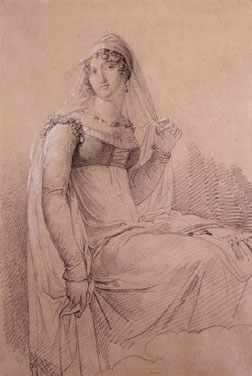 The Brogan Museum will host an exhibition about women from the Napoléonic era and the intellectual salons of the day. The word salon first appears in French in 1664 (from the Italian word sala, or room). A salon is a gathering of stimulating people of intellectual curiosity. Meetings frequently took place in the home of an inspiring hostess. Guests came partly to amuse one another and partly to refine their taste and increase their knowledge through conversation and readings. Salons commonly are associated with French literary and philosophical salons of the 17th and 18th centuries, but have been carried on to the present day in urban settings among like-minded people.
The Brogan Museum will host an exhibition about women from the Napoléonic era and the intellectual salons of the day. The word salon first appears in French in 1664 (from the Italian word sala, or room). A salon is a gathering of stimulating people of intellectual curiosity. Meetings frequently took place in the home of an inspiring hostess. Guests came partly to amuse one another and partly to refine their taste and increase their knowledge through conversation and readings. Salons commonly are associated with French literary and philosophical salons of the 17th and 18th centuries, but have been carried on to the present day in urban settings among like-minded people.
The 18th-century Paris salons brought together people from Parisian society and the progressive thinkers, or philosophes, who were producing the first encyclopedia.
The following describes one woman’s famous salon in French culture:
"The circle was formed of persons who were not bound together. She had taken them here and there in society, but so well assorted were they that once there they fell into harmony like the strings of an instrument touched by an able hand."
Such a woman in German circles, inspiring to writers and artists, perhaps without an artistic bent herself, was called a "muse."
Cynthia Hollis
The Mary Brogan Museum of Art and Science
The Mary Brogan Museum of Art and Science
No comments:
Post a Comment